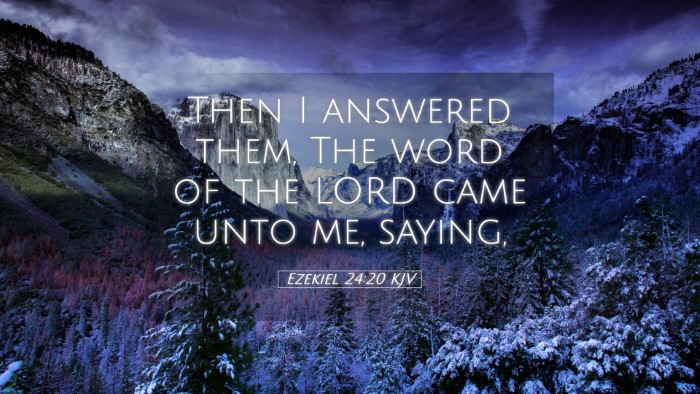Bible Commentary on Ezekiel 24:20
Ezekiel 24:20 (ESV): "And when I said to them, ‘This is the Lord God’s word,’ they would not listen."
Introduction
The book of Ezekiel presents a profound narrative chronicling the prophetic ministry of Ezekiel during a critical time in Israel's history. Chapter 24 marks a significant moment as God conveys powerful messages through symbolic acts, particularly focusing on the coming judgment. This commentary synthesizes insights from classic public domain commentaries such as Matthew Henry, Adam Clarke, and Albert Barnes, hoping to provide spiritual depth for pastors, students, theologians, and Bible scholars.
Contextual Analysis
Understanding the verse necessitates a contextual examination. Ezekiel prophesied during the Babylonian exile, a time marked by immense distress and spiritual apathy among the Israelites. Chapter 24 vividly captures the impending destruction of Jerusalem and the temple, using poignant imagery to highlight God's displeasure and enduring judgment.
Matthew Henry notes that the "great remarkableness" of this chapter lies in the intense and emotional portrayal of God’s relationship with His people. The destruction is not merely an act of punishment but rather a reflection of Israel's persistent disobedience and covenant unfaithfulness.
Exegesis of Ezekiel 24:20
Ezekiel 24:20 emphasizes the rejection of God's word by the people. Adam Clarke elucidates that this refusal exposes the hardness of their hearts and a rebellious spirit among the Israelites: “they would not listen.” This lack of response serves as a cautionary tale regarding the danger of spiritual insensitivity.
Albert Barnes emphasizes God's earnest communication of His will and the people's negligence in heeding that message. This profound obstinacy, he explains, leads to dire consequences, illustrating a stark warning against ignoring divine warnings in any generation.
Thematic Insights
-
The Rejection of Prophetic Words:
The phrase "they would not listen" underscores a recurring theme in the prophetic literature— the defensive posture of God's people against divine intervention. The consistent refusal to accept prophetic messages resonates through scripture, illustrating human tendencies toward rebellion.
-
The Nature of Divine Communication:
God’s communication is clear, yet oftentimes, by human choice, it becomes misunderstood or ignored. The prophet Ezekiel is depicted as the mouthpiece of God, yet his messages are met with apathy. Matthew Henry's commentary suggests that the power of God’s word is unyielding, and the failure to heed it inevitably leads to loss and destruction.
-
The Call to Spiritual Discernment:
This verse serves as an urgent call for discernment among God’s people. Clarke mentions that the refusal to acknowledge God’s word stems from a dangerous lack of spiritual awareness. For contemporary believers, recognizing and responding to God’s messages remains essential for maintaining a thriving faith.
Application for Today’s Believers
The rejection observed in Ezekiel 24:20 prompts several applications for today's church. Firstly, it serves as an encouragement to be attentive and responsive to God’s Word. Contemporary modern distractions can lead to similar spiritual apathy as seen in ancient Israel. Pastors and leaders must cultivate environments where God’s word is heard, valued, and acted upon.
Moreover, this verse challenges believers to examine their hearts and ensure they are not falling into patterns of ignoring the messages delivered through scripture or spiritual leaders. Just as Ezekiel faced rejection, so too may modern leaders find their messages unheeded. This highlights the importance of perseverance in the ministry of the Word, despite the responses received.
Conclusion
Ezekiel 24:20 captures a pivotal moment in prophetic history, illustrating the tragic consequences of a people’s rejection of divine counsel. Combining insights from Matthew Henry, Albert Barnes, and Adam Clarke provides a rich tapestry of understanding regarding the urgency of responsiveness to God’s Word. As believers engage with this verse, may they be reminded of the importance of heeding divine instruction, fostering a spirit of humility, and remaining teachable in their faith walk.


